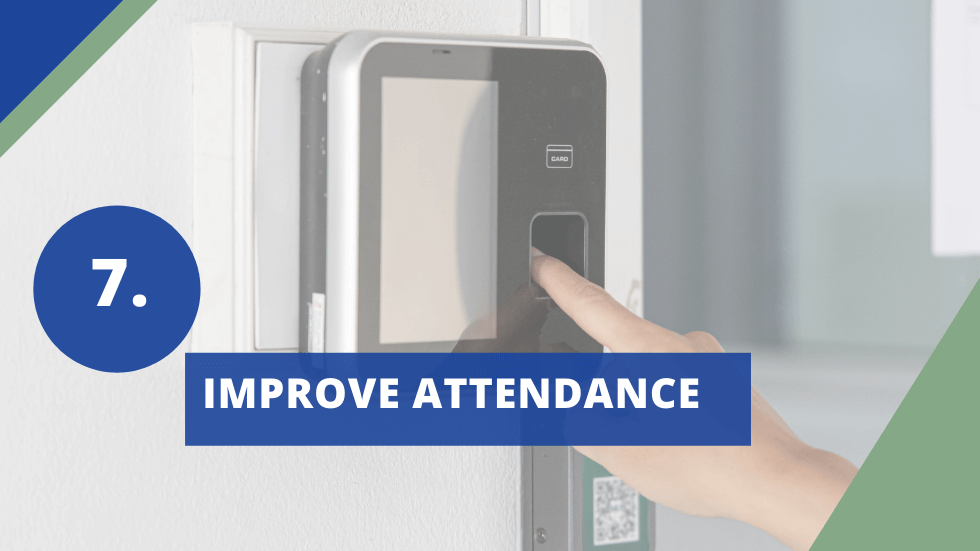According to a recent report published by LinkedIn, companies that have high ratings on compensation and benefits have 56 percent lower attrition rates than those with low ratings.
If you want to set your employees and your company up for long-term success and job satisfaction, a great benefits package should be at the top of your priority list.
Are you unconvinced that benefits are important? If so, outlined below are the top 10 reasons why you need to start taking your company’s employee benefits seriously.
1. Improve Employee Retention Rates
As was mentioned above, employee attrition rates decrease when companies offer generous employee benefits, including robust health insurance coverage. Furthermore, a recent survey showed that 77 percent of respondents would consider leaving a job if they didn’t feel the benefits were worth their time and effort.
As the current job climate and the “Great Resignation” have shown us, employees are less willing than ever to stick with a job if they don’t feel they’re being treated fairly.
Millions of people quit their jobs in 2021, and they’ve made it clear that they expect more from their employers. If you want to keep your employees around long-term, offering them good health benefits is one of the best things you can do.
Keep in mind, too, that the cost of hiring new employees will almost always end up being higher than the upfront cost of health insurance premiums.
Some employers resist the idea of offering health insurance, or they offer the most minimalistic plan possible, because they’re worried about the expense of health benefits for their employees. If this is the case for you, remember that providing good healthcare now can result in more savings later.
2. Attract Better Employees
If you were looking for a job, health benefits would likely be one of the first things you considered when weighing your options. In fact, the majority (80 percent) of employees say they would rather have additional benefits instead of a pay raise.
Candidates are going to ask questions about your health insurance plans and other benefits when they’re meeting with you for job interviews. Make sure you can give them satisfactory answers to your questions. Otherwise, they may decide to take a job with a different company that has better health coverage.
Remember, the current job market is a “seeker’s market.” In other words, there are more jobs available than there are people to fill them.
Do you want your company to be competitive? Do you want to have a chance at bringing the best people onto your team? If so, you need to make sure you’re making the job enticing, and a big part of that is offering great benefits.
3. Improve Morale
Think about how much time your employees spend at work each day. Between their 8-hour shifts at the office and their commutes to and from work, the average employee probably spends more time during the week doing work-related tasks than they do hanging out with their families.
Your employees give you and your business a lot of their valuable time and energy from (at the very least) Monday through Friday. Shouldn’t you do what you can to ensure they have a positive experience in the workplace?
Remember, happy employees are productive, hard-working employees. When morale is high in the workplace, team members have an easier time getting things done, and they’re more likely to stick with your company long-term.
Offering good health benefits is an excellent way to improve morale. Not only do these benefits help them to feel more secure in their work lives and personal lives, but they also help them to feel valued for all the hard work they do.
4. Increase Employee Engagement
In addition to improving workplace morale, comprehensive employee benefits also help to increase employee engagement.
In the United States, a mere 36 percent of employees are actively engaged while on the job. What does this mean if your employees aren’t part of this small group?
A lack of engagement may mean that your employees are doing the bare minimum. Over time, it can also lead to poor work performance, more frequent mistakes, and unhappy clients or customers.
Low rates of engagement can also contribute to higher attrition rates and lower retention rates.
The same study linked above also reveals that 15 percent of workers are actively disengaged. Among this 15 percent, 74 percent are seeking new jobs or watching for openings.
5. Improve Company Reputation
A company that doesn’t offer good employee benefits (or any benefits at all) is not going to have a very good online reputation.
These days, it’s easy for people to hop online and leave reviews about their current or past employers. They can provide feedback regarding salaries, company culture, work-life balance, and, of course, benefits.
Job seekers regularly check out these review websites to get a better idea of whether or not a particular employer is a good fit for them.
If you want to attract good employees to your team, you need to make sure your company has a great reputation and is being represented fairly online. Providing the right kinds of benefits helps to make this happen.
6. Prevent the Spread of Illnesses
Particularly in this day and age, with the COVID-19 pandemic still raging across the globe, employees should not be coming to work if they’re feeling sick. Not only does this contribute to the spread of various illnesses (not just COVID-19 and its many variants), but it also affects productivity and gets in the way of employees’ work-life balance.
When you offer good health benefits at your company, you make it easier for your employees to take time off when they’re sick. You also help them to get proper care early, which in turn allows them to get back to work sooner.
7. Improve Attendance
Think about these two scenarios for a moment.
Scenario 1: An employee takes two days off of work because they’re feeling a little under the weather. They come back feeling rested and recovered, they pick up where they left off, and they get back to business as usual.
Scenario 2: An employee feels sick but doesn’t want to take time off because they can’t afford to miss a day of work. They continue to show up and work while they’re sick, spreading their germs around the office. Eventually, their illness worsens and they’re forced to take time off, as are all of the employees they infected because they didn’t stay home.
Most employers would agree that the first scenario is the more preferable one.
When employees have benefits like paid sick days and good health insurance, this allows them to easily go to the doctor and get the medication they need. It’s also easier for them to recover and get back to work, which improves productivity and keeps the company running smoothly.
8. Improve Employees’ Financial Stability
When employees have access to good healthcare coverage, they’re more likely to be financially stable compared to those who have limited health insurance or no insurance at all. After all, they won’t be spending hundreds or thousands of dollars every time they have to go to the doctor or hospital and receive treatment.
Why does this matter? First, financially stable employees are less likely to be stressed and distracted in the workplace. Second, stress and distractions can also lead to mistakes that affect the company’s customer satisfaction rating and profitability.
9. Reduce Labor Costs
Speaking of profitability, employers who have healthier workers also will not run into expensive labor costs as often.
For example, think about employees who can go to the doctor regularly and get the care they need. With proper care and better overall health, there is less of a chance that these people’s employers will have to worry about paying for things like high disability insurance premiums or high workers’ compensation premiums.
10. Enjoy Tax Advantages
Finally, there are certain tax advantages that business owners (particularly small business owners) can enjoy when they offer health insurance to their employees. For example, the Small Business Health Care Tax Credit incentives employers to offer health insurance by providing them with a tax credit when they meet the following criteria:
- Have fewer than 25 full-time employees
- Pay average wages of less than $50,000 a year
- Offer a health plan purchased through the Small Business Health Options Program Marketplace
- Pay at least half of the cost of health care coverage for each employee
This is yet another example of how offering generous employee benefits, particularly health benefits, can save you money in the long run.
Get Help Choosing Employee Insurance Plans Today
Now that you know more about the importance of offering great employee benefits, are you ready to improve your employee insurance options?
If you need help understanding the different types of health insurance plans and picking the best one for your employees, we’re here to help at Commercial Benefits Services.
With over 30 years of experience in the insurance industry, we can design a benefits package that aligns with all of your needs. Contact us today to schedule a free, no-obligation consultation.











